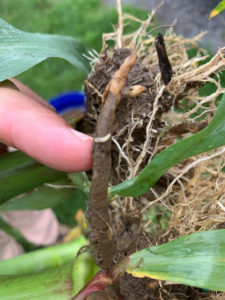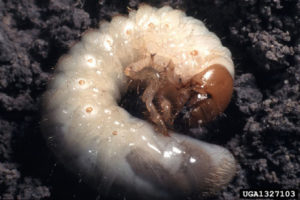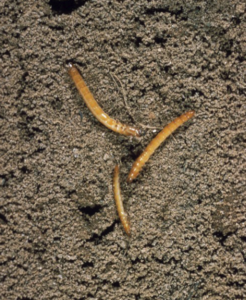Introduction
Planning for potential insect problems is an important aspect of corn production planning, especially prior to planting. Some corn pests can cause severe damage and potentially cause yield losses. Pesticides are recommended when there is potential for pest damage to cause economic losses greater than pest management costs (i.e., when economic thresholds are met). Another consideration is insect pressure can vary greatly from field to field (different soil types and different crop rotation) and from year to year. Therefore, decisions concerning pest management options should be made with careful consideration of the history of insect problems in an area and the field history where corn is to be planted.
Are soil-applied insecticides a good way to manage early season corn insect pests?
Yes, soil-applied insecticides can be an effective method to help manage corn rootworms (Figure 1) and other early season corn insect pests. Soil applied insecticides may also help manage black cutworm, grubs (Figure 2) and wireworm1 (Figure 3). Three application techniques are available to treat soil: preplant broadcast, row band or T-band, and in-furrow at planting.

Figure 1. Corn rootworm larvae feeding on a corn root

Figure 2. White Grub in soil
(Photo courtesy of Alton N. Sparks, Jr., University of Georgia, Bugwood.org)

Figure 3. Wireworms in soil
(Photo courtessy of R.J. Reynolds Tobacco Company Slide Set, R.J. Reynolds Tobacco Company, Bugwood.org)
Are soil-applied insecticides available in both liquid and granular formulations?
Yes, both liquid and granular formulations are available. However, the number of granular products available is greatly reduced from the number of options available before Bacillus thuringiensis (B.t.) technology corn products were introduced. Before commercialization of B.t. corn products, a soil-applied insecticide was one of the only options available to growers anticipating economic rootworm injury in continuous or rotated corn. The use of a granular or liquid soil-applied insecticide on a non-rootworm B.t. corn product remains a viable tactic to protect corn roots.(1)
Can granular or liquid insecticides be used together with rootworm traited B.t.corn products to control rootworm larvae?
No, it is not recommended to use both a rootworm traited B.t. corn product and a granular or liquid insecticide application in the same crop year for larval rootworm control. If a single treatment option is considered to not provide the needed larval rootworm control required by the producer, then the best option is to rotate that field out of corn production for at least one year. Rotating out of corn production for one year can help reduce the corn rootworm pressure in most fields.
Are there additional pests controlled by a soil-applied insecticide?
One soil pest of corn that can be found on the list of pests controlled by some granular soil insecticides are plant-parasitic nematodes, which are a non-insect pest. Not every granular soil insecticide has nematodes on the label, so growers should read the product label prior to application to determine the pests that it controls.
Conclusion
Each soil-applied insecticide has its advantages and disadvantages depending on cost per acre, pests controlled, ease of use, local restrictions, application window for best control, and risk of personal exposure to the insecticide during application. When using pesticides, always follow the label instructions and use appropriate personal protective equipment (PPE).
